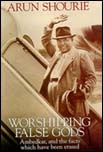The fight for independence, if we look a bit deeply, was an effort by non working urban middle class to wrest he powers from British and , to perpetuate or rather, accentuate the exploitation of the working classes of this country.
Not just Ambedkar, but one would find many other examples of great persons, who worked for people, but never targeted the British rule much. To me, Sir Chotturam is one such example.
He emancipated millions of peasants from the clutches of money lenders in the United Punjab. To me or, the people of this region, spread across Haryana, Punjab, Delhi and Pakistan Punjab, he is much more revered than the freedom fighters. Only few like Bhagat Singh, Subhash Bose and other martys draw same respect as Chottu ram.
Chottu ram understood what the Congress movement was about and left it in 1921 after 5 years of joining it. Reasons: 1. Congress was not making emancipation of farmers as a core issue 2. country's revenue comes from villages and get invested in cities. Congress was not ready to challenge it. 3. Congress not ready to accept farmers as active participants in national movement.
Today, the person, who actually brought freedom to millions of farmers, is obliterated from the history books.
As far as I understand, Congress was about Hindu urban middle class, who wanted to replace the British as new rulers and continue to loot the masses of this country.
Ambedkar had a greater enemy than the British to fight. So, you can not fault him.
On Sun, May 11, 2014 at 3:03 AM, Dr. J. K. Chaudhry <jkchaudhry@gmail.com> wrote:
Admire Ambedkar for his contribution ionLet he,who has never sinned,cast the first stone....bibleDo not focus on warts and pimples alone,IF you want to make friends ...or heroes.J.K.Chaudhry
Sent from my iPadWhat's the purpose of this write up?Nobody can discount the personality of BabaSaheb.( I a pedigreed member of Brahmin Casteam in total awe of the great person who overcame great challenges and consider him an AVATAR / Siddhapurush in the mold of rishis and gnanis). His shortcomings are minuscule as compared to Gandhi/ Nehrus/ Jinnah.A rough estimate puts Lower Castes( Sudras) , Dalits and Adivasis constitute a whopping 70% of BharatVasis.So is' nt it a travesty of natural justice to perpetuate backwardness of majority. Meritocracy is good but welfare of majority is the crying need .Please spare me and like minded people of this vitriol.Veteran TTKishore
On Wednesday, May 7, 2014, hindu speaks <comment-reply@wordpress.com> wrote:
Respond to this post by replying above this line
Thanks for flying with WordPress.com
--LTCOL(retd) T T KISHORE
Post: "indiaresists@lists.riseup.net"
Exit: "indiaresists-unsubscribe@lists.riseup.net"
Quit: "https://lists.riseup.net/www/signoff/indiaresists"
Help: https://help.riseup.net/en/list-user
WWW : http://indiaagainstcorruption.net.in
Diwan Singh
Ridge Bachao Andolan
Campaign for Preservation of Commons

No comments:
Post a Comment